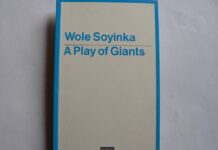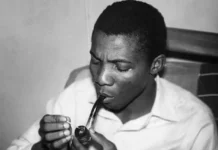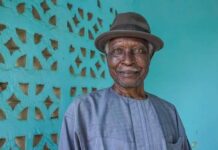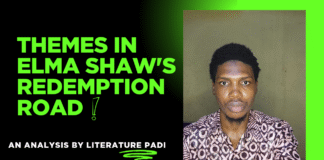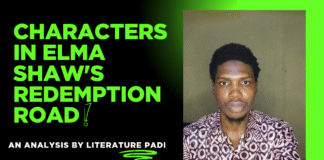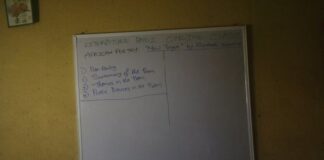🎥 We’re cooking something delicious for you on our YouTube channel. In the coming days, you will learn SSCE literature texts like you're in class 📚✍🏽
Be part of this new journey we are about to embark on.
🔔 Subscribe Now
Stanza-by-Stanza Analysis of “Hurrah for Thunder”
Stanza 1 (lines 1–2)
This brief stanza sets a tone of curiosity and impending drama. The speaker opens by questioning the fate of the elephant and immediately follows with the refrain “Hurrah for thunder,” to signal excitement about an upheaval. Apparently, the elephant has been struck down by the thunder.
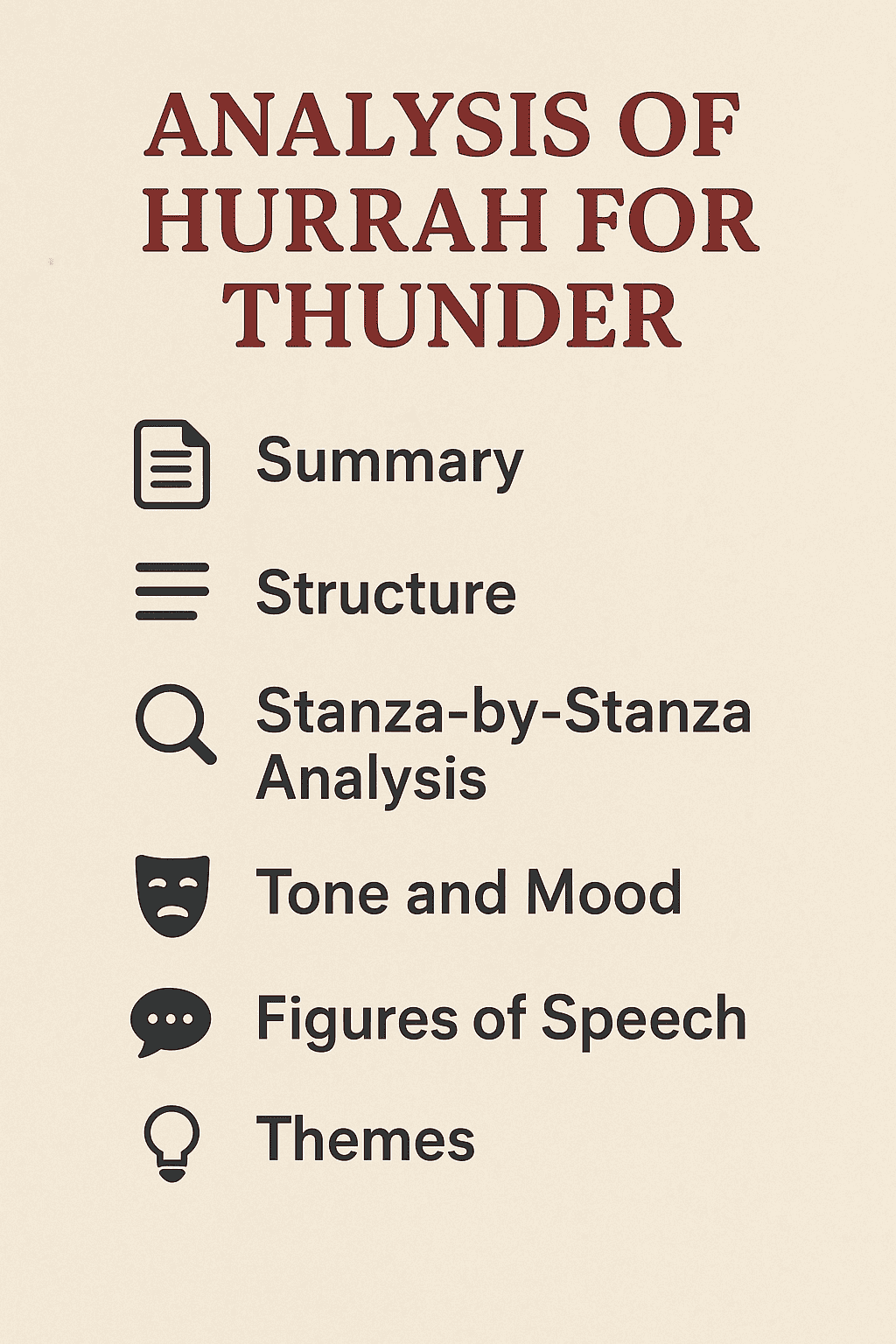
Stanza 2 (lines 3–8)
Stanza 2 provides the needed background information about the symbolic elephant in this poem. He is described as the “tetrarch of the jungle” (l. 3) who uproots trees effortlessly, with heavy, pounding legs that leave the ground bare of grass wherever he walks. In other words, the elephant is portrayed as a ruler of the jungle with immense physical strength and dominance over his environment.
The elephant, so described for his larger-than-life capabilities and his commanding presence, is the democratic government of Nigeria’s First Republic headed by Sir Abubakar Tafawa Balewa who was its Federal Prime Minister. The expression “Tetrarch of the jungle” captures the oppressive image of rulership of this period. The “four mortar legs” in line 6 represent the four regional governments personified by the four premiers of the North, West, East, Mid-West. They have become so powerful that people dare not invite their wrath.
The “legs” and the entirety of the elephant invoke fear in the “grass”, otherwise, the masses. There is a disconnect between the rulers and the ruled here, especially with the position that “wherever they (the four mortar legs) treaded / the grass was forbidden to be there” (l. 7-8). This confirms the post-independence disillusionment of the people with their governments (both federal and regional). The people do not see eye to eye with their government. There are political crises, electoral crises, political persecution, corruption to sum up the several issues that led to fall of this civilian government.
Also worth noting is the fact how the rulers pull the four regions of the country to the ground effortlessly with divisive words and anti-people governmental decisions. This is visible in lines 4 to 5: “With a wave of the hand / He could pull four trees to the ground”. The poet’s choice of words (“pull”, “pounded”, “treaded”, “forbidden”) further corroborate the stance of the suffocating control of politicians over their followers; the division between the two and the increasing resentment the masses harbor for the regime of Tafawa Balewa and his regional associates.
The second stanza of “Hurrah for Thunder” thus positions the elephant as a terror invoking, almost-unconquerable force, deserving no pity no matter what has happened to him.
Get the Full Analysis in PDF
Enjoying this breakdown? What you’re reading is just part of the full experience. The premium PDF edition brings everything together in one seamless, distraction-free document that has the poem, themes, structure, and full commentary. If you’re studying seriously, this is the version you’ll want.
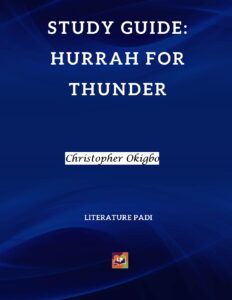
Stanza 3 (lines 9–10)
The third stanza indicates the downfall of the elephant; one which the thunder is an agent of. It’s quite an irony that the government (elephant), despite its overbearing power and its alarming proportion of oppression and atrocities, could fall, through the caustic intervention of thunder. The upheaval displaces Balewa-led government when a group of young army officers staged a violent coup d’etat that claimed the lives of Balewa himself, some of the regional premiers, Federal ministers, and several others.
Stanza 4 (lines 11–12)
With the fall of the elephant in the previous stanza, this stanza projects the image of hunters dividing the spoils. The hunters in this context are the soldiers who, in the manner of vultures and scavengers, are deliberating on how to share the national cake or treasury (“pumpkins”) and corner power (“meat”) to themselves. The poet warns them to remember the disruptive change that supplanted their predecessors (“elephant”) while at it.
Stanza 4 issues a caveat to the soldiers that their pettiness, selfishness, and greediness may have ripple effect on the general wellbeing of the country; that any wrong decision will land the country in much bigger mess. This is why the poet advises the new power holders to shun nepotism and be fair in their decisions, with the consciousness that what befell their predecessors may befall them too. Okigbo’s fears would later manifest in the form of a counter-coup and later, a civil war. For Okigbo, this is what “let them remember the thunder” implies; a nemetic counter-coup and the possibility of secessions.
Stanza 5 (lines 13–14)
Okigbo is not done yet with his recommendations. Only that in this stanza, he delivers them in a proverbial way with two proverb-like statements. The first one is “The eye that looks down will surely see the nose” (l. 13), which means that if the new power takers are observant enough, they will discern the patterns that led to downfall of their predecessors, learn to avoid them, and devise the paths to take going forward. This line calls for necessary patience to study the patterns of history and learn from them.
The other statement is “The finger that fits should be used to pick the nose”. This particular line asks that the best men should be given the responsibility of governing the country; that the most qualified people should be assigned the roles of navigating the country out of the mess it was in already. In other words, Christopher Okigbo asks that history should not be repeated while advocating for good governance.
Stanza 6 (lines 15–16)
The sixth stanza begins with the fleeting nature of time, noting how today quickly turns into yesterday and the place of the immutable law of nature that change is bound to happen with the passage of time. It is against this inevitability that the poet sets the numerous empty promises the government makes and the almost predictable betrayal of the people’s trust and expectations that follows. The poet is saying if you are promising to fight corruption, do just that efficiently without excuses; don’t make promises you can’t fulfill or live up to.
In essence, the poet is saying each government, with the passage of time, will be remembered for its legacy; so, he is asking the new government to lay down a good legacy, with the consciousness that it would become history and be remembered for its actions and inactions.
Stanza 7 (lines 17–18)
In the final stanza of “Hurrah for Thunder”, the poet cautions himself from attracting danger for his criticism of the government and his socio-political prognosis. He does this with the awareness that critics of repressive government end up, being imprisoned, harmed or killed; a deplorable consequence he sums up as “go(ing) to hell” (l. 17). He knows the same fate might befall him if he fails to stop, but he also acknowledges his role as a poet whose crusade is for social justice. It is on this note of the indecision of “Okigbo, town-crier” with his “iron bell” that the poem ends.
Receive Literary Updates through our Social Media Channels:
- WhatsApp: Literature PADI
- Telegram: Literature PADI
- YouTube: @literaturepadi
- Facebook: Literature PADI


